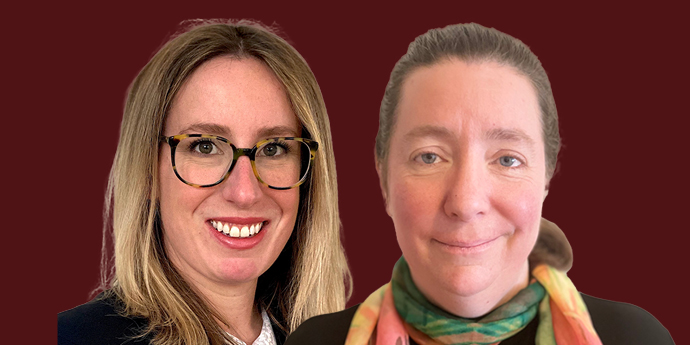Last winter, 2021 Rappaport Law and Public Policy Fellows Jennifer White and Emily Dillan, both 2Ls at the University of Massachusetts School of Law, were attending a Student Bar Association workshop focused on mental health when a student expressed her struggles balancing her own trauma against the trauma experienced by her clients in the law school’s Immigration Clinic. White, a licensed clinical social worker, and Dillan, a JD/MSW candidate through UMass’ dual-degree program, saw an opportunity to combine their talents and bring a specialized program to their campus community addressing this very issue. Although as first-year law students they had yet to experience legal practice through experiential learning, their respective backgrounds allowed them to recognize the symbiotic relationship between the trauma experience and the legal services being sought.
The women met with both Assistant Dean of Students Julie Cahill and Adjunct Professor and Director of Academic Success Amy Vaughan-Thomas to discuss the applicability of the proposed program to the school’s existing curriculum, and spent this past summer working closely with Director of Clinical Programs Margaret Drew, who serves as the project’s faculty advisor, to further refine their idea. In working with these individuals, White and Dillan learned that while UMass Law’s Legal Skills curriculum and various clinics do include training on client interviewing, these programs are not available until the students’ second year and many students will not work in the clinics during their tenure at the law school, instead choosing to fulfill their experiential learning requirement through various field placements and other opportunities. Thus, while the program was designed to complement skills learned within the existing UMass Law curriculum, the women saw the necessity for a workshop focused on trauma-informed interviewing techniques made accessible to the entire student body, including first-year students looking toward their first summer internship and upper-level students who may not necessarily be exposed to this training through participation in the school’s many clinics but who still desire it for their own professional development.
The resulting program, “Meeting Clients Where They Are At: Special Skills for Interviewing,” will be offered on the UMass Law campus as a two-part panel series offered in the Fall and Spring semesters. Both sessions will open with a medical professional speaking about the impact of trauma on a person’s body and mind, followed by several legal practitioners of various specialties (including immigration, domestic violence, civil rights, and plaintiff-side general practice) sharing their own insights about working with clients that are experiencing trauma. The workshop has been sponsored by the campus’s Diversity, Equity and Inclusion Committee in addition to the many affinity groups reflecting UMass Law’s diverse student body. White and Dillan are passionate about the mission of the program, hoping that it will become a regular part of the UMass Law community’s programming, and that all involved will be better able to Pursue Justice (the UMass Law mission) on behalf of their clients.



